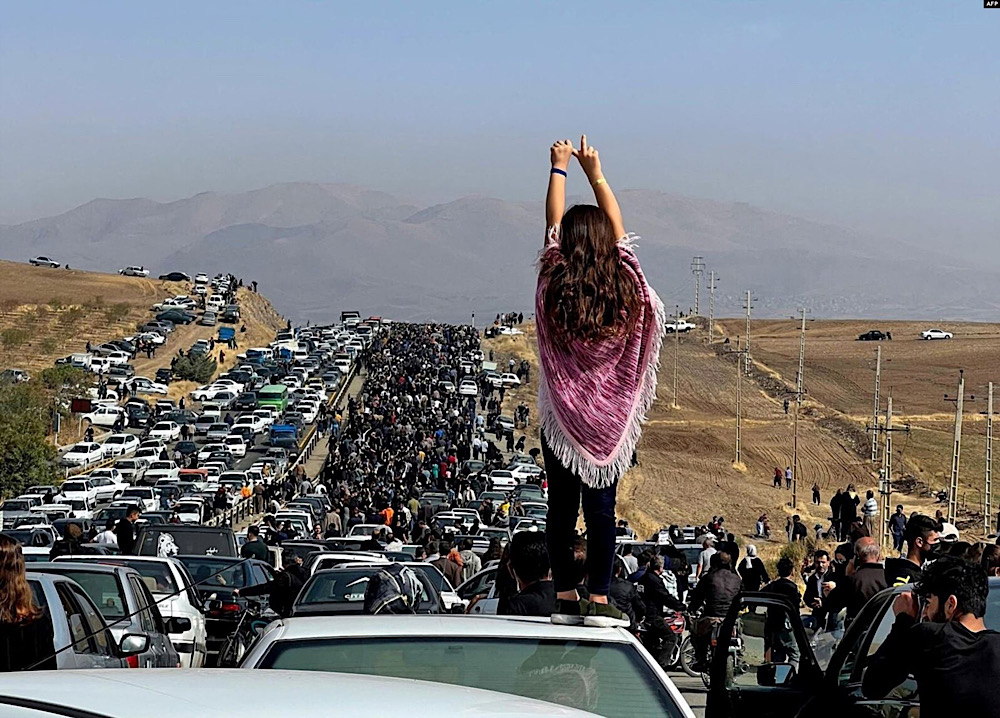UN report: minorities, including Christians, targeted by regime during pro-Mahsa Amini protests
A new report by a UN fact-finding mission exposes the repression endured by Iran’s ethnic and religious minorities. In the Islamic Republic, persecution on gender grounds intersects with persecution on ethnic and religious grounds. Even children are victims of particularly serious violence. The hijab hides “gender apartheid”.
Tehran (AsiaNews) – A new report by a UN fact-finding mission found that Iran’s religious minorities, including Christians, have been among the targets of the brutal repression carried out by the country’s clerical regime against the "Woman, Life, Freedom" protest movement, sparked by the killing of 22-year-old Kurdish woman Mahsa Amini.
Released on Monday, the study looked at the crackdown against the wave of protests that developed after the death of the young woman in Tehran at the hands of the morality police for not properly wearing the hijab, the Islamic headcover.
Titled "They have dehumanised us," the research shows how ethnic and religious minorities in the Islamic Republic have been "disproportionately impacted" by the crackdown against the protest movement.
After interviewing several victims, the UN mission “found that the crime against humanity of persecution on gender grounds committed in the context of the protests, intersected with persecution on ethnic and religious grounds under human rights law.”
Ethnic and religious minorities in Iran, “in particular ethnic Kurds and Baluch,” have been the target of "disproportionate" repression by the government during nationwide protests.
The document highlights several serious human rights violations committed by Iranian security forces against members of minorities, including suspicious deaths, extrajudicial executions, and unnecessary use of force with a lethal character.
Many of the violations – arbitrary arrests, torture, rape, enforced disappearances, and gender-based persecution – amount to “crimes against humanity”.
According to the Independent International Fact-Finding Mission, this situation is the "direct result of long-standing discrimination" that "must end immediately".
Iranian authorities have reportedly carried out arbitrary mass arrests and detained members of ethnic and religious minorities for the sole reason of joining the protest or expressing solidarity with the grassroots movement.
They have also subjected detainees to inhumane conditions, torture, ill-treatment, rape, and other forms of sexual and gender-based violence.
Tehran's particular resolve to quell protests had already been observed in the recent past, in particular in a study published by Article18, an advocacy group, and three other international Christian organisations monitoring rights violations.
The 2023 UN report notes the intensification of the wave of repression against Christians, especially converts, due to their "peaceful religious activities".
In particular, security forces threatened many Christians who took part in the nationwide protests, while at least five converts arrested during the demonstrations faced the additional charge of "apostasy" after their religion came to light through examination of their phone records.
During the crackdown, “children belonging to ethnic and religious minorities suffered particularly egregious violations," the report goes on to say.
The victims were subjected to “killings and maiming, arrests, enforced disappearances, detention, as well as torture and rape and other forms of sexual violence, resulting in lasting harm.”
In addition, minority children face “structural discrimination” and government repression, “among them, expelled Baha’i students and a Christian couple denied the right to adopt a child because of their religious beliefs.”
According to the report, minority women and girls are "doubly victimised" in a political system “that fundamentally discriminates against them on the grounds of gender, ethnicity and religion.”
Women from ethnic and religious minorities may “be restricted in expressing their culture and their religion”, a fate “compounded by pre-existing discrimination and violence against them both as women, as well as by virtue of their status as ethnic and religious minorities.”
Finally, the UN fact-finding mission shows how laws and regulations on compulsory hijab constitute a real "gender apartheid".
In this regard, former UN Special Rapporteur on the situation of human rights in Iran Javaid Rehman pointed the finger at the mandatory hijab for women from religious minorities, which represents a "grave violations of human rights” in a “climate of impunity”.
05/04/2023 16:04
01/06/2009







.png)










